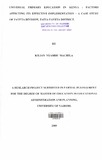| dc.description.abstract | The attainment of Universal Primary Education (UPE) by the year 2005 and Education For All (EFA) by 2015 has been one of the major developmental goals of the Kenya government (Republic of Kenya, 2003 (b)). To achieve this goal, the government, has adopted several strategies and measures since independence, the latest one being the declaration of Free Primary Education (FPE) in January 2003. However, despite all these efforts, the attainment of the goal of UPE seems to be elusive.
The purpose of this study was therefore to investigate factors that affect the effective implementation of UPE in Taveta division, Taita Taveta district. The study sought to determine the extent of educational wastage in primary schools in Taveta division and the particular factors that are responsible for this wastage. The study further sought to investigate on measures that could be employed to solve the problems affecting the effective implementation of UPE. The study attempted to answer research questions touching on areas such as the extent of non enrolment, repetition and drop out phenomena in primary schools in the division; the factors responsible for this phenomena; the availability and quality of teaching and learning facilities and resources and the possible solutions to the problems affecting the implementation ofUPE.
The literature review of this study explored the historical development of the concept ofUPE and the magnitude of the implementation ofUPE. Key challenges facing the implementation of UPE and the specific factors affecting UPE's effective implementation have been discussed. It was from the review of these factors that a conceptual framework was developed.
The study was ex-post facto in design and it targeted twenty seven primary schools in the division. Two sets of questionnaires were used as the instruments of data collection. Headteachers and classteachers were the main respondents. A pilot study was conducted before the main study in three schools that were randomly selected to test the validity and reliability of
v
the instrument. This led to the modification of the research instrument. In total twenty four headteachers and thirty classteachers responded to the questionnaire representing thus a hundred parent return rate. Descriptive statistics mainly frequencies and percentages were used to
analyse the data. UNIVERSITY OF NAIROBI
EAST AFRICANA COLLECTION
Data analysis revealed that there was an educational wastage problem in the division. The study found out that a number of school-going age children had not yet enrolled in school. In addition, for those who were in school, many were repeating classes while others had dropped out of school. The study identified several factors that contributed to pupil's non-enrolment, repetition and drop out from schools, thereby rendering the implementation of UPE ineffective. The factors were: parental ignorance and negligence of education, poor economic growth and increased poverty, child labour, the effects of HIVIA IDS pandemic and teenage pregnancies and early marriage. Others included: truancy and irregular school attendance, over emphasis on passing of examination, children involvement in domestic chores, insecurity and social strife and inadequate school facilities and resources. Also discovered were: children involvement in negative cultural practices, poor school administration and indiscipline of pupils, teachers conduct at their place of work, long distance to schools and lack of school places, and the high cost of schooling. Inappropriate policy framework, cost sharing policy and mismanagement of education were other factors affecting the implementation of UPE.
To ensure that UPE is effectively implemented, the study identified several measures, which could help solve the problems discussed. Those solutions ranged from those requiring government's intervention to those requiring teachers, parents, pupils and other stakeholders involvement.
The study gave some recommendations that could help in ensuring effective implementation of
UPE. These include: the sensitization of parents and children on the importance of education,
the harmonization of the Children's Act with the Education Act, increasing the access to basic education by improving and expanding school facilities and resources, recruitment and training of education personnel on the implementation of UPE and the formulation of a clear policy on the implementation of basic education.
Finally, the study provided suggestions for further research. These were: the replication of the study using a large sample of primary schools in the country; conducting of another research involving other educational stakeholders and conducting a further research on the impact of UPE / FPE on the quality of education offered in Kenya | en |

